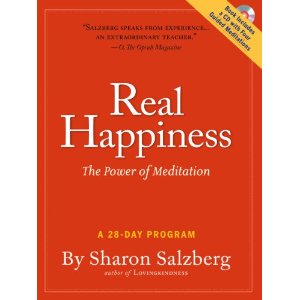 |
 |
Real Happiness and Meditation Meditation: What It Is … and Isn't < back to Real Happiness and Meditation
When I first returned in 1974 from studying in India, I'd commonly find myself at a party or in a social situation where someone would ask me, "What do you do?" When I replied, "I teach meditation," I'd more often than not hear them say "Oh," as they sidled away. The implication of their reaction was very clear: "That's weird!"
Nowadays, largely because of scientific research into meditation's effect on the brain and immune system, and the pioneering efforts of clinicians to study the effects of meditation on all areas of life where the quality of our attention makes a difference (such as depression, anxiety, addiction and healing), the most common response I hear when I say, "I teach meditation," is "I'm so stressed out, I could really use you." I am also amused to sometimes hear, "You know, my partner should really meet you."
A more disconcerting, and fairly common response is, "I tried meditation once. I realized I couldn't do it. I failed at it, because I couldn't stop thinking." But in actuality, since it's in the nature of the mind to wander, it is not that you are failing at meditation if your mind does not stay on the breath or mantra or whatever object you are trying to focus on. Meditation is not a matter of trying to stop thinking or make your mind go blank, but rather to realize when your attention is wandering and to simply let go of the thoughts and begin again. It is a way of changing our relationship to our thoughts, so we're not so consumed by them, with no sense of space. Having a newly spacious relationship to our thoughts brings both peace and freedom.
This classic meditation approach is designed to deepen the force of concentration. If you consider how scattered, how distracted, how out of the moment we may ordinarily be, you can see the benefit of gathering that energy, gathering your attention. We can reclaim all of that energy, which could be available to us but usually isn't because we throw it away into the past, into the future, into judgment, into speculation. Over time, we gather all of that attention and energy to become integrated, to have a center, to not be so fragmented, so torn apart. So even though we might take a very simple object, an ordinary object, like the feeling of the breath to focus on, as we practice it has the effect of really bringing us to a sense of wholeness, a sense of empowerment.
Here's one reason why focusing on the feeling of the in and out breath is a classic foundational exercise in meditation: The breath is very portable. If we can practice being connected, being aware, when we're sitting formally, when we say, "Oh now I'm going to be meditating," we can also be practicing standing in line impatiently at the grocery store, sitting anxiously in a doctor's waiting room. Anywhere we are breathing we can be meditating. It's private, free, ours.
If you wish to explore meditation, this is a way you can begin:
You can sit comfortably. You don't have to feel self conscious, as though you are about to do something special or weird. Just be at ease. It helps if your back can be straight, without being strained or overarched. You can close your eyes or not, however you feel comfortable. And notice where the feeling of the breath is most predominant, at the nostrils, at the chest or at the abdomen. Rest your attention lightly, in just that area.
See if you can feel just one breath, from the beginning through the middle, to the end. If you're with the breath at the nostrils, it may be tingling, vibration, warmth, coolness. If at the abdomen, it may be movement, pressure, stretching, release. You don't have to name them, but feel them. It's just one breath.
And if images or sounds, emotions, sensations arise, but they're not strong enough to actually take you away from the feeling of the breath, just let them flow on by. You don't have to follow after them, you don't have to attack them, you're breathing. It's like seeing a friend in a crowd, you don't have to shove everyone else aside or make them go away, but your enthusiasm, your interest, is going toward your friend, "Oh there's my friend. There's the breath."
But if something arises? Sensations, emotions, memories, plans, whatever it might be ? That's strong enough to take your attention away from the feeling of the breath, or if you've fallen asleep or get lost in some incredible fantasy, the moment you realize you've been distracted is the magic moment. Instead of judging yourself or berating yourself, see if you can let go of the distraction, and gently return your attention to the feeling of the breath.
< back
to Real Happiness & Meditation
Sharon's latest book is Real Happiness: The Power of Meditation: A 28-Day Program, published by Workman Publishing. She is also the author of The Kindness Handbook and The Force of Kindness, both published by Sounds True; Faith: Trusting Your Own Deepest Experience, published by Riverhead Books; Lovingkindness: The Revolutionary Art of Happiness and A Heart as Wide as the World, both published by Shambhala Publications; and co-author with Joseph Goldstein of Insight Meditation, a Step-by-Step Course on How to Meditate (audio), from Sounds True. She has edited Voices of Insight, an anthology of writings by vipassana teachers in the West, also published by Shambhala.
Sharon Salzberg is cofounder of the Insight Meditation Society (IMS) in Barre, Massachusetts. She has played a crucial role in bringing Asian meditation practices to the West. The ancient Buddhist practices of vipassana (mindfulness) and metta (lovingkindness) are the foundations of her work. "Each of us has a genuine capacity for love, forgiveness, wisdom and compassion. Meditation awakens these qualities so that we can discover for ourselves the unique happiness that is our birthright." For more information about Sharon, please visit: www.SharonSalzberg.com.
< back
to Real Happiness and Meditation |
|||
Home | About Us | Features | Ask
Our Team | Inspiration
& Practice | Women of Vision | Resources
Copyright 2011 Feminist.com. All rights reserved.

